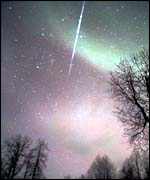
 |
Meteoroids - comet dust |
|
| |
 Every day on average the Earth sweeps up over 8 tonnes of dust from its path, that's 3000 tonnes per year! Most of this material comes from comets, and it has been speculated that it is from comets that life may have spawned, or at least got a helping hand... Every day on average the Earth sweeps up over 8 tonnes of dust from its path, that's 3000 tonnes per year! Most of this material comes from comets, and it has been speculated that it is from comets that life may have spawned, or at least got a helping hand...
Shooting Stars?Virtually all the material is burned up in the atmosphere. Grains of dust as big as sand will burn brightly enough to produce a streak of light across the sky. For example, the photograph on the right shows a so-called meteor burning up in the night sky. They are commonly called shooting stars. The green and pink glow is the Aurora Borealis. The tails occur in the lower levels of the thermosphere, at altitudes from 80km to 120km. Entry speeds vary, but can be as fast as 70km/s. Meteors appear to originate from the same point in the sky - the radiant - but this results from perspective: the particles are in fact travelling in parallel paths. There are as many as 1,500 active radiants, but the major showers (named after their parent constellations) are shown in the table. "You have more chance of being hit by a falling aeroplane, than by a meteorite."  View/Sign Guestbook |
Table 1: Major Meteor Showers
Crash LandingA large enough lump of rock will survive entry into the Earth's atmosphere, and make it to the surface (normally sinking without trace into the ocean). These are called meteorites, not meteors. Meteorites are not exactly rare, but a few years ago a dog was killed outright by one in Egypt. However, it has been said that...Scientists have found meteorites on Earth that originate from the surface of Mars - they are very rare! More soon... For more information on meteors: International Meteor Organization GCSE MaterialFind much more on meteors on GCSE.com.
| ||||||||||||||||||||||||||||||||
|
Sun | Mercury | Venus | Earth | Moon | Mars | Asteroids | Jupiter | Saturn | Uranus | Neptune | Pluto | X | Kuiper | |||||||||||||||||||||||||||||||||